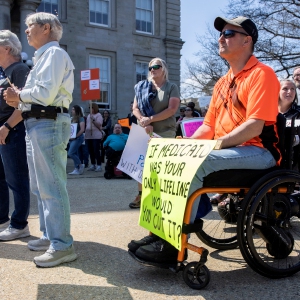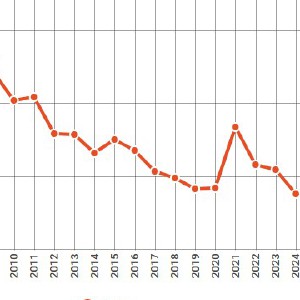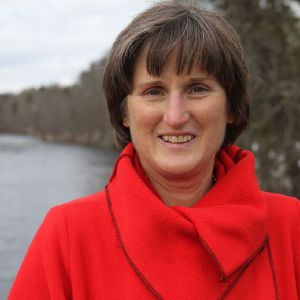‘The best thing for Warner’: Manufactured home residents purchase their park, forming the 151st co-op in N.H.
| Published: 09-19-2024 5:45 PM |
Heather Otten never thought she’d be a homeowner.
When she moved into a single-wide manufactured house in Warner, she was 20 years old with no credit, a newborn and her second child on the way.
Now, 14 years later, she’s a partial owner of the 33-home park on Pleasant Lake in Warner, after residents formed a cooperative to purchase the property their houses sit on. Park owners, Peter and Terri Wyman, approached residents about the sale, hoping to fend off out-of-state investors who may have priced residents out otherwise.
The $2.3 million sale was finalized at the end of August. With it, Otten watched her neighbors take a sigh of relief as the park became New Hampshire’s 151st resident-owned community.
“Everyone just collectively relaxed after the sale went through and they know that they have some control in the situation,” she said. “You always kind of worried because you were on someone else’s land.”
Owning a manufactured house means having a stake in the structure but renting the land that it sits on, with monthly costs left to the discretion of park owners. When the lot rent goes up, some are priced out of their homes, while others are pigeonholed from selling, as prospective buyers do not want to take on high costs.
That fear always lingered in the back of Otten’s mind.
“A lot of people were concerned if a corporation had come in, if they would have been kicked off their lot and had to move their home or be priced out,” she said.
Article continues after...
Yesterday's Most Read Articles
At Pleasant Lake Estates, the Wymans purchased the park and adjacent campsite 23 years ago. They envisioned that it would be the start of a family business, passed on to their daughter when they decided to retire.
That decision came this winter. But with kids, and a business of her own, keeping the park in the family wasn’t feasible for their daughter. Offers for the park trickled in.
An investor from New York was eager to buy. But as the Wymans weighed the decision, one question remained – what would happen to the residents, whose kids they’ve watched grow up over the last 20 years, and who became neighbors, family and friends.
“I was concerned what was going to happen with the community,” said Peter Wyman.
Just take Otten, for example.
When she bought the single-wide house towards the end of the dirt road in the park, securing a mortgage was out of the picture with her lack of credit.
The Wymans offered her a “rent to buy” option – putting monthly payments towards gaining full ownership of the property, and within four years, it was hers outright.
Owning a house meant she could install new beige siding to replace the barn red she disliked and build a shed for her family’s bikes. Her kids – now 15, 13 and 10 – have a yard to play in, and a campground and lake to explore on site.
It also meant she could start to build her Halloween graveyard in the front lawn – embracing the self-proclaimed “crazy Halloween lady” title – with so many decorations, it takes her three days to set up every year.
Her neighbors may have known her from the blow-up ghosts and robotic Grim Reaper. Admittedly, she didn’t know many of them until the cooperation came together.
“There are some of my neighbors I didn’t even know their name before all this began,” she said. “Getting to know people and their families and their stories a little bit, now you’ll see people drive through and everyone’s waving.”
Out of the 33 homes in the park, 31 are cooperative members. With an ownership stake, they pay $660 a month, while nonmembers are charged $685.
To purchase the park, they began organizing in March with the help of New Hampshire’s Community Loan Fund, before closing in August.
New Hampshire has a rich history of supporting resident-owned communities, with the first cooperative in the country formed in Meredith in 1984. State law requires park owners to offer residents the right of first refusal with a sale. As the Wymans looked at a purchase and sale agreement with the investor, they knew a letter would go to residents giving them 60 days to come up with an offer.
Before signing, they thought, why not ask park residents themselves – if they had an interest, they could negotiate a sale price without the 60-day deadline looming overhead.
To form a cooperative, park residents elected a leadership board of five members, who are also responsible for managing the campground business onsite. The Community Loan Fund helped the group through the sale process – which was a difference maker to Otten.
“Thankfully,” she said. “If we had to navigate it ourselves, it would have been a nightmare.”
And through trainings and guidance from the fund, they also established a governance structure as the new owners. The cooperative will hold annual membership meetings – to vote on bylaws and leadership – and have printed contracts for new members.
That’s not to say all leadership conversations are easy to navigate. Pets were the center of a recent contentious debate. The majority voted for no dogs in the park and to enforce an indoor cat-only requirement.
“Not everyone was happy with the vote but we are going with the majority,” she said.
At least everyone had a say in the decision, she added.
On the sign for Pleasant Lake Estates, a banner now hangs that reads “We own it!”
Soon, a new sign will be installed that honors their ownership with a new name – the Pleasant Pond Co-Op and Campground.
With revenue from the campground and control of their own spending (Otten is weighing snow plow pricing currently), she hopes that the community can buck the trend of rising costs in today’s housing market.
“Everyone will get a nice relief from that as well," she said. “Instead of it just going up and up and up.”
While the Wymans are looking toward retirement – with plans to continue to camp in the park's grounds for fun – the sale allowed them to preserve a sliver of affordable housing in a community they’ve watched become increasingly expensive for long-term residents.
“Overall, I think it’s been a very positive thing for the community,” said Peter Wyman. “Long term, it’s really going to be the best thing for Warner, which is why we wanted to do that.”










 Baseball: Slow night at the plate costs Concord in loss to Windham, 3-1
Baseball: Slow night at the plate costs Concord in loss to Windham, 3-1 ‘It's like slow genocide’: Crowd rallies against proposed Medicaid cuts
‘It's like slow genocide’: Crowd rallies against proposed Medicaid cuts New Hampshire births fell to a modern low in 2024
New Hampshire births fell to a modern low in 2024 ‘New Hampshire is just going to embarrass itself’: Former Child Advocate warns against proposed office cuts
‘New Hampshire is just going to embarrass itself’: Former Child Advocate warns against proposed office cuts
